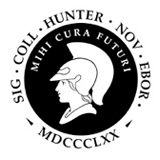Building an Integrated Identification, Engagement and Assessment Infrastructure for STEM Enrichment Programs at Hunter College
PROJECT OVERVIEW:
The “Building an Integrated Identification, Engagement and Assessment Infrastructure for STEM Enrichment Programs at Hunter College” is an award with a vision that includes transforming how STEM enrichment programs are made available to students at CUNY Hunter College, facilitating faculty work in the area of student education within STEM enrichment programs and collaboration across programs, and leveraging the intellectual capital of current grant-funded programs.
The goals of the project are to:
1. Identify students for recruitment into the STEM programs at a much earlier time and broaden participation;
2. Expand the paths for information about and application to the programs at critical educational junctures;
3. Reinvent the mentoring of students in the programs and their research placements to better integrate research and education; and
4. Assess our effectiveness and track our students to create an information loop that will feed back into each stage of the process from recruitment to post-baccalaureate.
The five NSF awards upon which the I³ project will build include:
1. Math and Science Partnership in New York City (0412413 to CUNY City University of New York);
2. The Catalyst Scholarship Program (0850021 to CUNY Hunter College)
3. The Noyce Teacher Academy Scholar Program (0833134 to CUNY Hunter College);
4. MIND Alliance for Minority Students with Disabilities in Science, Technology, Engineering and Mathematics (0833392 to CUNY Hunter College); and
5. New York City Louis Stokes Alliance Phase IV (0703449 to CUNY City College).
The project team proposed to achieve the four stated goals by creating a multifaceted model of institutional integration for CUNY Hunter College. This model includes a new administrative function in the Office of the Provost complementing a Science Advisory Board; a plan to bring together faculty and professional staff from Student Services, Admissions, Institutional Research, Assessment, and Institutional Technology; a plan to implement new computer software technology for improved communication across the student, faculty and administrative communities; and a plan to create a sustainable infrastructure for the science programs which can accommodate growth and continued innovation. This work will focus on three primary areas: Student recruitment and identification, student engagement, and the creation of an information infrastructure for student tracking, reporting and assessment.
Dates:
Start: June 01, 2010End: May 31, 2015


